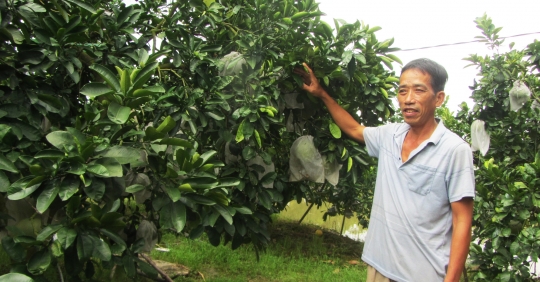Sai Son Township in Quoc Oai District (Hanoi) has the famous Thay Pagoda spiritual tourist area in the country. Also known as the VietGAP Pomelo, this location produces over 1 million fruits a year. Mr. Nguyen Kim Manh’s pomelo gardener mixed with fish ponds is one of the typical gardeners.
Working a lifetime isn’t as good as a year on a farm
Mr. Manh said that for a long time before 2003, he followed groups of painters and repair workers. Due to his erratic life, erratic work, he doesn’t earn any money to “distribute the sugar” and feed his mouth and has no money to help his wife and children, which makes Mr. Manh very thoughtful, especially sometimes, when he sees the scene the first woman who turns away the dark side working year round is not enough to cover the family’s living expenses.
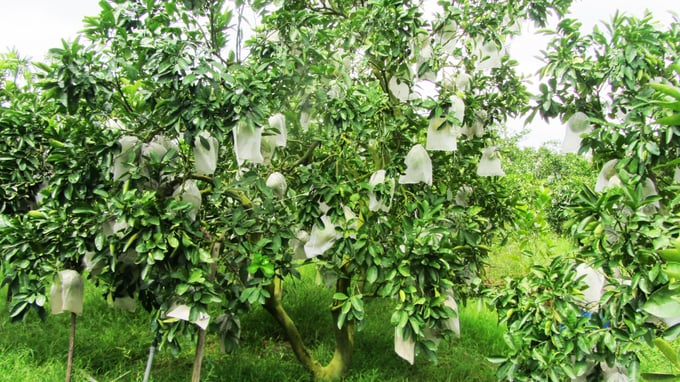
Grapefruit trees are covered in fruits that help prevent yellow flies and prevent sunburn from causing skin tans. Picture: HaiTien.
Manh thinks he can’t work as a wage laborer for life, he has to settle down to lose his job. After much deliberation, he decided to return to his hometown, lease low-lying fields from people, and then switch to fruit and fish farming.
“When I first came here the fields were still white and the water clear and the roads and streets were barely covered by bike lanes so I had to hire someone to criss-cross the land and fill the garden. Also, up to 1ha of ponds need to be dug to get 1ha of garden suitable for rapid drainage for growing fruit trees,” Manh said.
After designing the farm, garden and pond, Manh also had to build a temporary house to store production materials, get electricity from the grid, install an automatic irrigation system and build a path to the farm, plant trees, breed fish.
In order for the grapefruit garden to bring business results soon, Mr. Manh decided to plant a branch tree. Thanks to intensive farming, Mr. Manh’s grapefruit garden has reaped a high yield after 5 years of planting, over 40,000 fruits every year, income 800 million VND, profit 400 million, along with the rest from other plants. Every year, Mr. Manh also earns VND 500 million. “As long as I’m in the business of painting and repairing houses, I’ll never have as much money in my life as working in the country for a year,” Manh boasted excitedly.
Experience for Dien grapefruit growers
According to Mr. Manh, the older the Dien pomelo tree, the more delicious it will be, planted on heavy soil or mixed clay, with balanced fertilization and regular pruning, it will yield bountiful fruit for more than 20 years. This is the greatest advantage of the grapefruit tree over the orange tree.
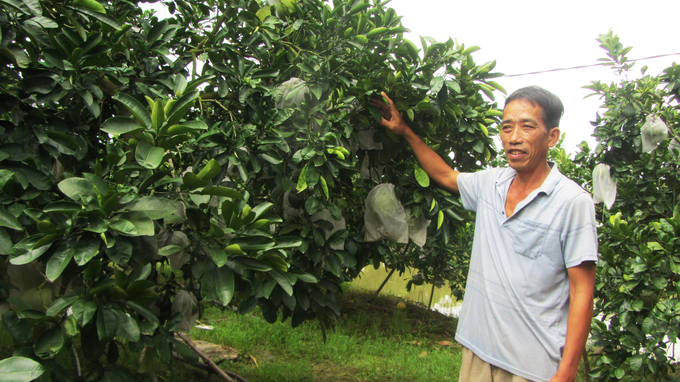
Thanks to compliance with VietGAP production techniques, Mr. Manh’s pomelo garden is always very pest-free, high quality fruit, beautiful design. Picture: HaiTien.
Grapefruit is grown by cuttings, the coefficient of propagation is low, but extracting it yourself, having selected the right variety, was not infected with yellow leaf disease (very dangerous disease). In particular, the tree will bear “good” fruit from the very first harvest. Grapefruit trees grown from grafted cultivars take 7-8 years to produce “good” fruit.
In order for the pomelo garden of Dien to produce fruit, 6-7 trees should be inter-grafted with 1 sour pomelo or other pomelo of different varieties, which will help increase the ability of cross-pollination on the tree, increase the rate of fruit set, and help to distribute the harvest (diene grapefruit for fruit collection. Around the New Year, the remaining varieties of pomelo were harvested in early August of the lunar calendar). In addition, the Pomelo variety Dien often bears fruit every two years, in order to overcome this disadvantage, in addition to thorough pruning immediately after harvest, watering the garden must be stopped from the beginning of September (lunar calendar) if the weather is too bad weather, Water little, slightly moisten garden soil.
To stimulate the plant to differentiate flowering shoots, gardeners need to water the pomelos again about 15 days before the annual lap spring. Especially in the lap spring years without drizzle or insignificant rain, it is necessary to water the garden about 3-4 days earlier than usual. In the years of lap spring, it rains more than usual, so water the plants 3-4 days later than usual. When the pomelo garden is in bloom and encounters frost, it must be immediately sprayed with water to wash the flowers, in order to avoid the risk of “white table” and crop failure.
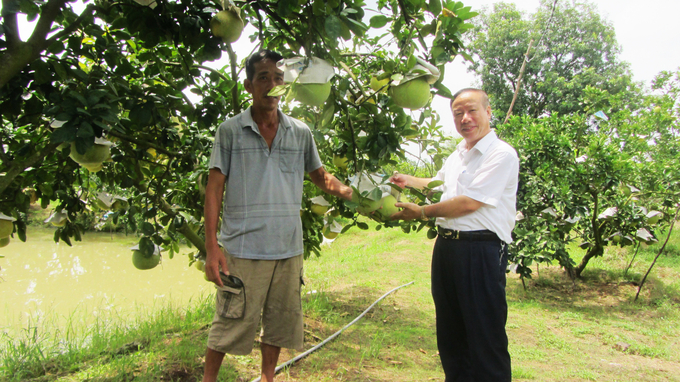
Not only Mr. Manh’s grapefruit garden, Sai Son Township has settled concentrated grapefruit growers with large commodities. Picture: HaiTien.
The object that is dangerous and can easily lead to mass loss of fruit on pomelo trees is the yellowfly. The best prevention against this pest are the pods. Use a special cloth bag to thread each fruit into a bag and secure the top of the bag. The wrap is also the best solution to avoid sun tanning that leads to tanning of the skin. The time for fruit packaging is in May (lunar calendar), by September, the bag must be removed to reveal all new fruit, to ensure product quality when harvested. Note that before and after fruit packing should be sprayed with insecticides and fungicides.
As for fertilization, in addition to fertilizing according to the VietGAP method trained by the Agricultural Advisory Board, Manh also dredged, dried, then pounded the pond mud to fertilize the plants, combined with the recycling of waste fish in the pond, soak Well incubated with superphosphate, get water to fertilize the grapefruit garden.
This approach has helped Mr. Manh save 50% of the amount of NPK applied to grapefruit trees. “The dried pond mud contains dead plants, the nutrients in the garden soil are washed away, and the manure released by farmed fish is much better than fertilizing with rotting manure,” explains Manh.
To increase the sweetness of the fruit, potassium must be added to the tree twice in the 8th and 9th lunar months. Apply 1 kg of potassium chloride to each root for the first time; For the 2nd time (September) apply 0.5 kg of potassium sulphate/root. Harvest the fruit on a dry day. Transporting fruit over long distances requires careful cushioning. Crushed grapefruit peels break the essential oil sacs inside and cannot preserve the fruit for long. In order to store the fruit until March next year, it must be stored in a cool, dry place.
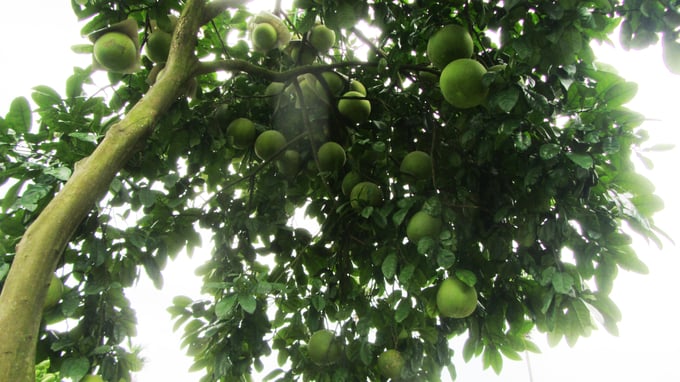
Acidic grapefruit trees mixed with diene grapefruit garden to increase fruit set rate. Picture: HaiTien.
Through his pomelo cultivation technique, Manh, although he has to pay nearly VND 40 million rent for the field per year, still makes an average profit of VND 500 million/year, which is often organized by Hanoi Horticultural Association for Farmers members come to visit and learn from experiences.
“Our locality has converted more than 100 ha of low-productivity land into high-yielding fruit trees. There, nearly 20 ha of VietGAP pomelos are produced according to the farm model, which provides the capital market with more than 1 million pomelos every year to ensure food safety and sanitation,” said Nguyen Nho Hoa, vice chairman of the Sai Municipality People’s Committee. Son said.

